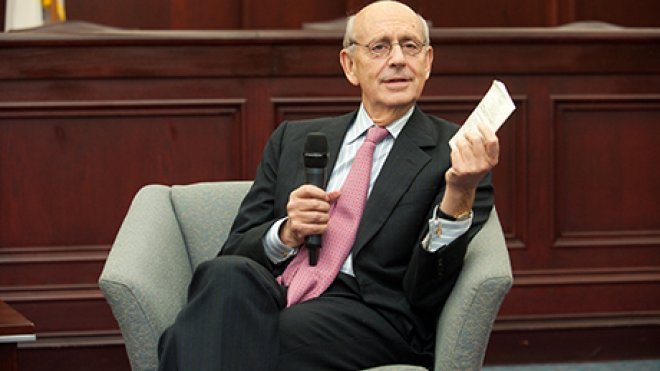Justice Breyer Cites Alumnus in Supreme Court Decision
In a sweeping dissent in a capital punishment case, U.S. Supreme Court Justice Stephen Breyer cites Jesse Nason '02, '05L from 'Roger Williams School of Law Review'

WASHINGTON, D.C. – The U.S. Supreme Court issued a major decision in a lethal-injection case on Monday – and it cites an article by Jesse Nason, an undergraduate and law school alumnus, in the Roger Williams University Law Review.
In the article, Nason – who earned a bachelor’s in paralegal studies in 2002 and his juris doctor in 2005 – examined whether bias occurs during jury selection for capital punishment cases before a trial even begins.
“I am extremely honored that my note was taken into consideration by Justice Breyer in his dissenting opinion,” said Nason, adding that his first emotion upon hearing the news from RWU School of Law Dean Michael J. Yelnosky was “disbelief.”
“My career now focuses on family law and domestic relations,” said Nason, a partner with the law firm of Kirshenbaum & Kirshenbaum in Cranston, R.I. “And while some of my divorcing clients may want me to seek the death penalty for their former spouses, this was not, in all honesty, a case that I had been following intently. I was therefore very surprised to learn that something I wrote more than a decade ago was being read and cited by the Supreme Court.”
The citation occurs in Justice Stephen G. Breyer’s sweeping dissent in the case of Glossip v. Gross, No. 14-7955, in which the court ruled 5-4 against three death row inmates who had sought to ban the use of the sedative midazolam, an execution drug they said could not reliably cause deep unconsciousness before the injection of other extremely painful agents that cause death.
In his dissent, Breyer, joined by Justice Ruth Bader Ginsburg, “came very close to announcing that they were ready to rule the death penalty unconstitutional,” the New York Times reported.
“Rather than try to patch up the death penalty’s legal wounds one at a time,” Justice Breyer said in the 46-page dissent, “I would ask for full briefing on a more basic question: whether the death penalty violates the Constitution.”
Breyer argued that “it is highly likely that the death penalty violates the Eighth Amendment,” which bars cruel and unusual punishments. He said there was evidence that innocent people have been executed, that death row exonerations were frequent, that death sentences were imposed arbitrarily and that the capital justice system was biased by racial discrimination and politics.